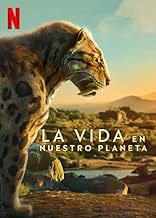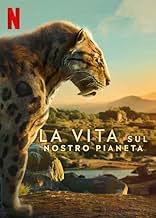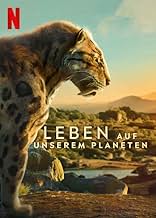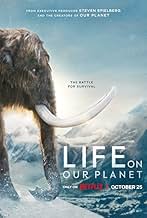La increíble historia del épico viaje de cuatro mil millones de años de la vida en la Tierra cobra vida en esta serie de Steven Spielberg y el equipo detrás de «Nuestro planeta».La increíble historia del épico viaje de cuatro mil millones de años de la vida en la Tierra cobra vida en esta serie de Steven Spielberg y el equipo detrás de «Nuestro planeta».La increíble historia del épico viaje de cuatro mil millones de años de la vida en la Tierra cobra vida en esta serie de Steven Spielberg y el equipo detrás de «Nuestro planeta».
- Reparto principal
- Reparto principal
- Nominado para 1 premio Primetime Emmy
- 2 premios y 14 nominaciones en total
Explorar episodios
Reseñas destacadas
It's visually beautiful and since Spielberg's name is attached to this series you can expect a visual spectacular which it is.
I loved every episode and as much as some complain the going back and forth during episodes to illustrate time periods this non linear change didn't bother me at all.
My only complaint..... I was expecting the full story of the human species just like they talked about every other species but they didn't it was like as if it was a second thought or ran out of time or funding. It was a very disappointing end to say the least. The final episode barely had 20 minutes of human species discussion.
I was left wanting more and there for was disappointed. But besides that it is a good documentary. Morgan Freeman as usual is a legend narrator.
I loved every episode and as much as some complain the going back and forth during episodes to illustrate time periods this non linear change didn't bother me at all.
My only complaint..... I was expecting the full story of the human species just like they talked about every other species but they didn't it was like as if it was a second thought or ran out of time or funding. It was a very disappointing end to say the least. The final episode barely had 20 minutes of human species discussion.
I was left wanting more and there for was disappointed. But besides that it is a good documentary. Morgan Freeman as usual is a legend narrator.
While comparison to both "Walking with Dinosaurs" and "Prehistoric Planet" is unavoidable it isn't the most fair way to judge a show. Both of the aforementioned shows are the cream of the crop of prehistoric documentary series and at least one of them also holds a fair bit of nostalgia for a lot of people (me included). It is unavoidable that in at least some ways any prehistoric documentary series would fall short if held to such high expectations. Being worse than those shows doesn't automatically make a show bad.
With that out of the way, let's actually try to review this series in an as objective way as possible.
First off, visuals and sound design. They're good, great even. The CGI could have been better but is still more than adequate. The animation is a bit floaty on occasion and if you really pay attention to it it will slightly break the immersion. I find the soundtrack to be great, it doesn't bother me or pull me away from the action and on at least a couple occasions I was actively appreceating it. Animal and surrounding sounds are fine, nothing stood out to me as bad, which is really all it needs to do. I also really like Morgan Freeman as a narrator.
The storytelling choices leave me a bit puzzled though. First of all, there is the addition of modern filmed documentary bits, which to me feel really unnecessary. They could have just made 30 minute episodes instead of padding the runtime in this very strange way. Because shooting nature documentaries isn't cheap or easy. Another problem with these are that they often aren't new for frequent documentary viewers and break your immersion.
The documentary is very informative and explains a lot of interesting concepts extremely well. The way it explained the great dying (Permian extinction) was amazing for example. There are some things that could have been improved though. The time period we find ourselves in often isn't made clear, especially in the first few episodes this can be annoying. They also tend to jump from here to there a bit too much, instead of just going chronologically.
It covers a lot of different species and stories per episode, which is great. I do wish that they would have been a bit more original in their choice of creatures instead of going for the more well know ones. There are a few mistakes (conscerning science and realism) but nothing terrible in my opinion.
I've focussed a lot on the "bad". But let me make clear that this series really isn't a bad one, not even in the slightest. It does fall short when compared to the giants that "Walking with Dinosaurs" and "Prehistoric Planet" are, but has a lot of merit in its own way and definitely deserves to exist and be watched.
With that out of the way, let's actually try to review this series in an as objective way as possible.
First off, visuals and sound design. They're good, great even. The CGI could have been better but is still more than adequate. The animation is a bit floaty on occasion and if you really pay attention to it it will slightly break the immersion. I find the soundtrack to be great, it doesn't bother me or pull me away from the action and on at least a couple occasions I was actively appreceating it. Animal and surrounding sounds are fine, nothing stood out to me as bad, which is really all it needs to do. I also really like Morgan Freeman as a narrator.
The storytelling choices leave me a bit puzzled though. First of all, there is the addition of modern filmed documentary bits, which to me feel really unnecessary. They could have just made 30 minute episodes instead of padding the runtime in this very strange way. Because shooting nature documentaries isn't cheap or easy. Another problem with these are that they often aren't new for frequent documentary viewers and break your immersion.
The documentary is very informative and explains a lot of interesting concepts extremely well. The way it explained the great dying (Permian extinction) was amazing for example. There are some things that could have been improved though. The time period we find ourselves in often isn't made clear, especially in the first few episodes this can be annoying. They also tend to jump from here to there a bit too much, instead of just going chronologically.
It covers a lot of different species and stories per episode, which is great. I do wish that they would have been a bit more original in their choice of creatures instead of going for the more well know ones. There are a few mistakes (conscerning science and realism) but nothing terrible in my opinion.
I've focussed a lot on the "bad". But let me make clear that this series really isn't a bad one, not even in the slightest. It does fall short when compared to the giants that "Walking with Dinosaurs" and "Prehistoric Planet" are, but has a lot of merit in its own way and definitely deserves to exist and be watched.
It was entertaining enough but for me it was a slightly dissapointing. There was hardly any mentioning as in wich era or epoch the events took place. The millions of years are mentioned but not if it was the Silurian or the Carniferous or Plioceen, to name a few. Furthermore there were too much images of modern animal life. The prehistoric life was ofcourse GCI but I've seen better in BBC documentaries. Morgan Freeman does a good job narrating this series but he is certainly no David Attenborough. All in all it was a good production but could've been better and even great if they showed more prehistoric life and less contemporary ones in this tale of the evolution of life on earth.
The new Netflix series "Life on our Planet" is really good. I liked it a lot.
It is a mix of astonishing wildlife photography and animation - the latter being so good it is difficult to tell which is which.
The sound production is also awesome (if you watch it you'll see what I mean).
I learned stuff, which is always good. I like how it focuses on the five mass extinctions. It motivated me to do some further reading about them.
Morgan Freeman narrates it brilliantly. He speaks clearly and with passion.
I really have nothing negative to say about it. There are people who compare it negatively to Attenborough series but I've not watched the latter and so... oh well. Nor have I seen the series people mention that is on AppleTV.
So... I happily recommend this series. I liked it a lot.
It is a mix of astonishing wildlife photography and animation - the latter being so good it is difficult to tell which is which.
The sound production is also awesome (if you watch it you'll see what I mean).
I learned stuff, which is always good. I like how it focuses on the five mass extinctions. It motivated me to do some further reading about them.
Morgan Freeman narrates it brilliantly. He speaks clearly and with passion.
I really have nothing negative to say about it. There are people who compare it negatively to Attenborough series but I've not watched the latter and so... oh well. Nor have I seen the series people mention that is on AppleTV.
So... I happily recommend this series. I liked it a lot.
Reeding alot of negative reviews here I had to add my opinion.
In was truly touched with this series, teers in my eyes, thinking about it for months after and opening up a whole new world for me. The music is so well made: dramatic en building up, with melodic themes coming back again and again (like star wars). This repetitiveness is also seen on the screen, where the rules of life explained in the first episode, and then shown in effect again and again. I mean this positively: these rules of life is what the series really is about, and this repetitiveness (with small adaptions) is what evolution basically is (very very roughly).
The serie is telling a story about our planet being (so far we know) unique in its ability to enable this life, but also the complete brutality of it, where only the most adapted survives, and even then mass extensions resets the stage, over and over again (in the series the 5 biggest are shown). For me, before this series, always boring to read about, but this has changed now.
Alot of people compare the serie with walking with dinosaurs, prehistoric planet and a planet earth. A very strange comparison: This series is not about dinosaurs. This is not a nature documentary to watch when having a hangover to relax. This series is also not aka National Geographic where it will zoom in and explain a specific topic with alot of detail.
No! This series will inspire you, with all its visual and musical power, to think about life itself, what it is, which rules it follows, and how miraculeus it is. And: how fragile, It can be all over within one day (at least for us humans). It will inspire you to broaden your knowledge afterwards about these time periods; about the Devonian, where the first amphibians came to land (long after the insects and plants), about the carbonian where newly evolved reptiles started laying eggs and as a result becoming less dependent on being near water; about the advantages and disadvantages of being warm blooded vs cold blooded; about being at the bottom of the food chain and then suddenly at the top and then at the bottom again. The series makes some assumptions but that is ok, with such a broad scope and so much tot tell, I understand these decisions.
This series is about life itself, and you have to pay attention.
If you want dinosaurs and relax this is not for you.
If your want to be inspired, find love and passion for biology: watch!
In was truly touched with this series, teers in my eyes, thinking about it for months after and opening up a whole new world for me. The music is so well made: dramatic en building up, with melodic themes coming back again and again (like star wars). This repetitiveness is also seen on the screen, where the rules of life explained in the first episode, and then shown in effect again and again. I mean this positively: these rules of life is what the series really is about, and this repetitiveness (with small adaptions) is what evolution basically is (very very roughly).
The serie is telling a story about our planet being (so far we know) unique in its ability to enable this life, but also the complete brutality of it, where only the most adapted survives, and even then mass extensions resets the stage, over and over again (in the series the 5 biggest are shown). For me, before this series, always boring to read about, but this has changed now.
Alot of people compare the serie with walking with dinosaurs, prehistoric planet and a planet earth. A very strange comparison: This series is not about dinosaurs. This is not a nature documentary to watch when having a hangover to relax. This series is also not aka National Geographic where it will zoom in and explain a specific topic with alot of detail.
No! This series will inspire you, with all its visual and musical power, to think about life itself, what it is, which rules it follows, and how miraculeus it is. And: how fragile, It can be all over within one day (at least for us humans). It will inspire you to broaden your knowledge afterwards about these time periods; about the Devonian, where the first amphibians came to land (long after the insects and plants), about the carbonian where newly evolved reptiles started laying eggs and as a result becoming less dependent on being near water; about the advantages and disadvantages of being warm blooded vs cold blooded; about being at the bottom of the food chain and then suddenly at the top and then at the bottom again. The series makes some assumptions but that is ok, with such a broad scope and so much tot tell, I understand these decisions.
This series is about life itself, and you have to pay attention.
If you want dinosaurs and relax this is not for you.
If your want to be inspired, find love and passion for biology: watch!
¿Sabías que...?
- CuriosidadesCGI effect sequences were done by Industrial Light & Magic or ILM, the same company that created the computer effects of the Jurassic Park and Jurassic World film series. According to paleontologist Bhart-Anjan Bhullar, a scientific consultant who worked with the ILM team, some of the animal models seen in the series could have been based on those seen in the Jurassic World films, albeit heavily updated to resemble real prehistoric animals rather than movie monsters. Bhullar suggested that ILM was aware that the Jurassic films had a mixed reputation among paleontology enthusiasts because the creatures seen in the films were not designed to be scientific (such as the oversized, scaly "raptors" that hark back to 1970s and 1980s depictions), so they tried to "get it right" with this series, and there was a lot of back and forth between the scientists and animators. Nevertheless, online paleo-communities have noted that some of the CGI animals presented in the series are still not up to 2020s scientific standards and feature odd mistakes like inaccurate skull shapes and body proportions. A few mistakes can be chalked up to science advancing while the series was being developed: the armored fish Dunkleosteus is shown with a long, slender body, though a 2023 study argued it would have been significantly shorter and more robust in life.
- PifiasIn one shot of the Arandaspis fish swimming near a reef, a scene supposedly set 475 million years ago when fish were just beginning to evolve, a present-day fish can be seen among the coral in the background.
Selecciones populares
Inicia sesión para calificar y añadir a tu lista para recibir recomendaciones personalizadas
- How many seasons does Life on Our Planet have?Con tecnología de Alexa
Detalles
- Duración1 hora
- Color
- Mezcla de sonido
- Relación de aspecto
- 16:9 HD
Contribuir a esta página
Sugerir un cambio o añadir el contenido que falta

Principal laguna de datos
What was the official certification given to La vida en nuestro planeta (2023) in Canada?
Responde






















